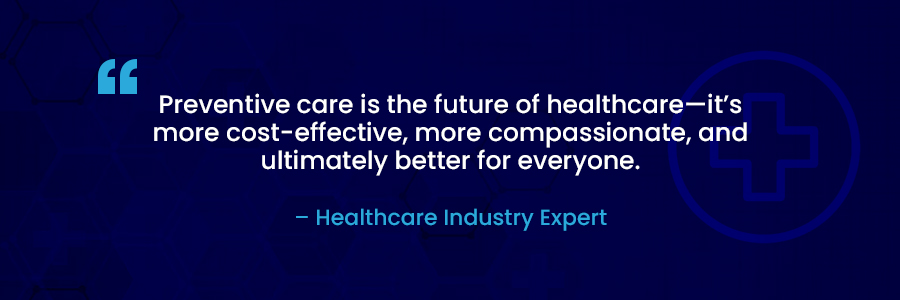There is a growing emphasis on preventive care in today’s healthcare landscape. Preventive services are no longer just an option—they are essential to improving overall health outcomes, reducing healthcare costs, and minimizing the burden of chronic diseases. Healthcare providers are at the forefront of this movement, tasked with guiding patients toward healthier lifestyles and encouraging proactive steps to avoid preventable conditions. Preventive care helps identify risks early, manage health issues before they escalate, and create a foundation for long-term health. Preventive care support plays a crucial role in empowering individuals with the tools and knowledge they need to make informed decisions about their health, ensuring they remain proactive in maintaining their well-being.
In this effort, healthcare providers must engage their patients in a variety of ways, ensuring that the entire system—from education to appointment scheduling—works together seamlessly. This is where Fusion CX, a leading healthcare call center provider, plays a critical role. As a customer experience management company, Fusion CX offers healthcare organizations innovative solutions to improve patient engagement, enhance preventive care outreach support, and streamline communication.
The Importance of Preventive Care in Healthcare
Preventive care is defined as the services that help detect and prevent illnesses before they become serious. These include screenings, vaccinations, and counseling on lifestyle changes like healthy eating and exercise. According to the Centers for Disease Control and Prevention (CDC), chronic diseases such as heart disease, diabetes, and obesity are the leading causes of death and disability in the U.S. Fortunately, these diseases are largely preventable through early detection and timely interventions.
The American Journal of Preventive Medicine found that regular engagement with preventive services like cancer screenings and wellness visits can reduce the incidence of chronic diseases by up to 30%. Moreover, the Health Affairs Journal has reported that preventive care can lower healthcare costs by 20% by reducing the need for expensive emergency care and hospitalizations.
For example, regular screenings for conditions like cancer, diabetes, and hypertension can catch these diseases in their early stages, leading to more successful treatment. Vaccinations prevent infections that might otherwise lead to serious complications. Lifestyle counseling can guide patients toward healthier habits that reduce their risk of developing chronic diseases.
The Role of Healthcare Providers in Preventive Care
Healthcare providers are integral to promoting preventive care. They are not only responsible for offering screenings and immunizations but also for educating patients about the importance of preventive services and encouraging them to take proactive steps in maintaining their health.
- Patient Education: One of the most powerful tools healthcare providers have is education. Many patients may not fully understand the importance of preventive care or may underestimate the value of annual check-ups. By explaining the benefits of screenings, vaccinations, and lifestyle modifications, providers can help patients take charge of their health.
- Timely and Accessible Care: To engage patients effectively in preventive care, it’s crucial that services are easily accessible. This includes offering flexible appointment times, providing reminders for upcoming appointments, and making it easy for patients to schedule screenings and vaccinations.
- Care Coordination: Patients often see multiple providers, including primary care physicians, specialists, and mental health professionals. Care coordination between these providers ensures that preventive services are delivered comprehensively and that nothing falls through the cracks. Communication is key to preventing gaps in care and improving patient outcomes. According to a study by the National Institutes of Health (NIH), 40% of patients experience fragmented care due to poor coordination among providers. This leads to inefficiencies and potentially harmful health outcomes.
- Community Engagement: Healthcare providers can take preventive care a step further by engaging with the community. Offering free health screenings at local events, partnering with local organizations, and educating underserved populations about preventive care are excellent ways to expand outreach. A study by the Robert Wood Johnson Foundation showed that healthcare organizations that engage with local communities see a 25% increase in appointment attendance.

How Fusion CX Can Support Preventive Care Initiatives
Fusion CX, with its expertise in patient engagement and customer experience management, can help healthcare providers strengthen their preventive care efforts. Fusion CX’s suite of services can improve patient outreach, streamline appointment scheduling, and ensure effective communication, all of which are crucial for the success of preventive care programs.
-
Enhanced Patient Outreach
Effective outreach is essential to ensuring that patients are aware of and motivated to take part in preventive care services. As Ritesh Chakraborty, Chief Service Officer of Fusion CX , explains: “Proactive patient outreach is key to engaging individuals and ensuring they understand the value of preventive care, not just the treatment of illness.” Fusion CX can help healthcare providers create personalized and timely outreach campaigns using multiple communication channels, including:
- Phone Calls: Personalized calls to patients can help remind them of their annual wellness visit (AWV) or upcoming screenings.
- Text Reminders: Short, friendly text messages can help ensure that patients remember important appointments and understand the value of these preventive services.
- Emails: Targeted emails that highlight the importance of preventive care and provide easy-to-understand information can keep patients informed.
Fusion CX can also segment patient populations and use language-specific outreach to engage diverse communities, making sure that language barriers do not impede access to critical services. A Journal of Health Communication study found that bilingual healthcare call centers can increase patient engagement by 25%, especially in communities with high Hispanic and Asian populations.
-
Appointment Scheduling and Reminders
A major hurdle in preventive care is ensuring that patients actually follow through with appointments. No-shows and missed appointments can delay or prevent early detection of health conditions. Fusion CX’s appointment scheduling services can help healthcare providers reduce these barriers:
- Scheduling Support. Fusion CX can handle inbound and outbound calls to schedule preventive care services, making the process easier for patients.
- Automated Reminders. By sending appointment reminders through text messages or phone calls, Fusion CX ensures that patients are more likely to keep their appointments.
- Rescheduling Assistance. Fusion CX can follow up with patients who miss their appointments to reschedule, ensuring that the care process continues without interruption.
-
Care Coordination and Follow-up
Effective care coordination is essential to ensuring that preventive care services are completed and that patients receive the appropriate follow-up. Fusion CX offers solutions that streamline communication across care teams and enhance follow-up services:
- Post-Visit Surveys: After a wellness visit, Fusion CX can conduct patient satisfaction surveys to assess the quality of service. These surveys also provide opportunities for continuous improvement.
- Health Risk Assessments (HRAs). Fusion CX conducts pre-visit HRAs to identify health risks and customize preventive care plans for each patient.
- Follow-up Services. Fusion CX schedules specialist appointments and shares educational materials for patients needing follow-ups. It ensures ongoing health support.
-
Data and Reporting for Continuous Improvement
Measuring the effectiveness of preventive care programs is essential for healthcare providers to refine their strategies. Fusion CX provides analytics and reporting tools that enable providers to track key performance indicators (KPIs), such as:
- Appointment Participation Rates: This helps healthcare providers gauge how many patients are engaging with preventive services.
- Patient Engagement Metrics: These metrics help measure how well outreach efforts are resonating with patients.
- Health Outcomes: Tracking long-term outcomes, like fewer hospital admissions, highlights the value of proactive preventive care.
These insights help healthcare providers refine preventive care programs for the best patient outcomes.
Conclusion
Preventive care is a critical component of the healthcare system. It helps reduce the prevalence of chronic diseases, lowers healthcare costs, and ultimately improves the quality of life for patients. Healthcare providers need the right tools, resources, and support to make preventive care effective and successful.
Fusion CX enhances preventive care with solutions for patient outreach, scheduling, and follow-ups. Its expertise improves engagement, streamlines processes, and supports better outcomes. Investing in preventive care secures healthier patients and a stronger healthcare future.
Healthcare providers can improve the patient experience by incorporating a healthcare call center like Fusion CX. It also enhances proactive outreach and helps build healthier communities.

